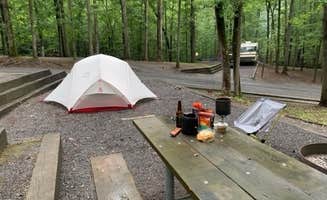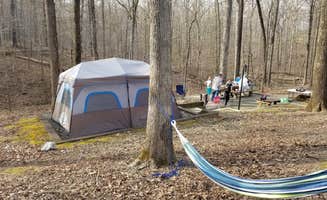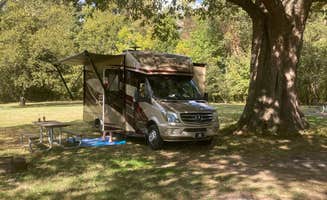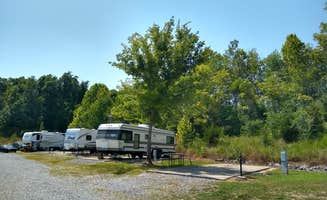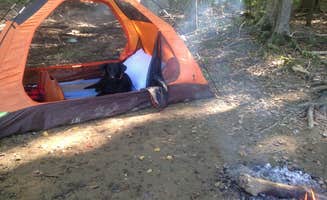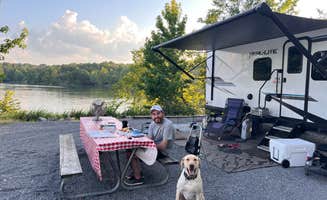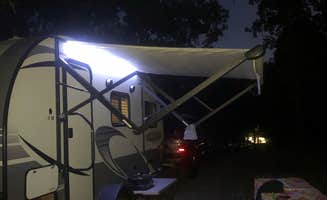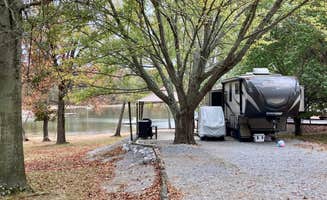Camping spots near Grand Rivers, Kentucky offer options for anglers, hikers, and outdoor enthusiasts across Land Between the Lakes National Recreation Area. Located at the northern entrance of LBL, the region spans 170,000 acres with elevations ranging from 359 to 566 feet. Seasonal water levels fluctuate up to 5 feet between summer and winter, affecting shoreline campsites and boat access points.
What to do
Canoe or kayak Energy Lake: Energy Lake Campground allows visitors to rent canoes for $10/hour to explore coves and wildlife. "I saw a doe with a spotted fawn nursing on my first trip onto the water," notes a camper at Energy Lake Campground. The no-wake lake makes it ideal for paddling.
Explore mountain bike trails: Access premier trails directly from Hillman Ferry Campground. "A premier and amazing mountain bike trail system is accessible directly from campground! The Canal Loop Trail and North South Trails are well known and revered by area mountain bikers and hikers," explains one visitor. Trails range from beginner to intermediate difficulty.
Visit nearby attractions: Within 20 minutes of most campgrounds, educational sites provide family activities. "Checked out the Elk and Bison Prairie, which was really cool. Nature station was really cool and we rented some canoes to explore around that area. Went to the Homeplace, which is a working farm and 'living history museum,' which the kids really loved," shares a camper who used Energy Lake Campground as their base.
What campers like
Waterfront camping options: Sites with direct lake access attract boaters who can moor vessels overnight. At Nickell Branch Campground, "I love the convenience to Grand Rivers, the ability to launch my boat onsite and all the shade trees overs sites along the shore," one visitor reports. Many waterfront sites have natural shade.
Shoreline access for bank fishing: Multiple campgrounds offer fishing opportunities without requiring a boat. Hurricane Creek Campground provides "lots of waterfront sites, a playground, beach, boat ramp, and small bath house," as described by a regular visitor who returns annually. Most fishing spots are within walking distance from campsites.
Primitive camping for solitude: Pisgah Bay offers quieter alternatives to developed campgrounds. "We were able to pull right up to the lake and secure our own private area, major score there. Only two other campers where present but we didn't notice due to there being enough space for privacy," writes one camper. These sites require no reservations and operate on a first-come basis.
What you should know
Reservation timing matters: Most campgrounds book quickly, especially for holiday weekends. For Canal Campground, "Reserve WAY ahead if you want one of the premium sites," recommends a camper who visited regularly. Waterfront sites typically fill 2-3 months in advance during peak season.
Bathhouse facilities vary widely: Some campgrounds have modern facilities while others offer basic services. A camper at Kentucky Dam Village State Resort Park noted, "Bathrooms were pretty ok. It was cleaned daily and always stocked. The water pressure was very low." Primitive campgrounds typically have vault toilets without showers.
Cell service fluctuates: Coverage can change significantly based on location and provider. A visitor to Hillman Ferry Campground reported "No WiFi or internet service. Cell signal in prior years have been spotty," while at Pisgah Bay another camper found "The cell service was extremely good. Better than at home."
Tips for camping with families
Look for playgrounds and designated swim areas: Several campgrounds have family-friendly facilities. At Hillman Ferry Campground, one visitor recommends: "Bring your bikes or golf cart. There are 2 playgrounds, multiple bath houses and a cute little store that you can walk/bike to. There is also lake access from multiple sites and a beach area."
Choose flat sites for tent camping with children: Terrain varies significantly between campground loops. A camper at Energy Lake Campground advised: "If you want flat spaces, don't go to loop D, loop C was much flatter. We probably won't return, but it was a nice stay, but probably better for those without small kids to entertain."
Consider campground size and noise levels: Smaller campgrounds offer quieter experiences for families. "This is a great campground as an alternative to Hillman Ferry, where we have often stayed. The cabins were clean and comfortable with cold AC, the hosts were friendly and the no-wake lake and canoe rentals were fun," notes a visitor comparing Energy Lake to larger facilities.
Tips from RVers
Check hookup distances: Many sites require extension cords and extra hoses. A visitor at Kentucky Dam Village reported: "Set just a few miles off of I-24 in Kentucky, water and electrical hookups are so far away from the camping site pads they will let you drop your RV camper or whatever any place in the grass so it's more convenient than going and having to buy hose and electrical extensions."
Site size limitations apply: Not all sites accommodate larger RVs. "Our 35 ft class a barely fit. They do show length limits for sites and they definitely max limit," warns an RVer at Kentucky Dam Village State Resort Park. Most sites have published length restrictions that should be strictly observed.
Leveling challenges exist: Many campsites require substantial leveling. At Hurricane Creek, "Camper sites have electric and water. They can accommodate all sizes of campers. Most sites are fairly level. Several sites are current being renovated," according to a recent visitor who found the campground well-maintained despite terrain challenges.


